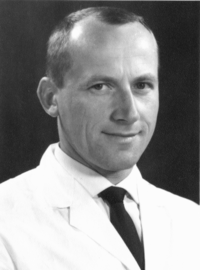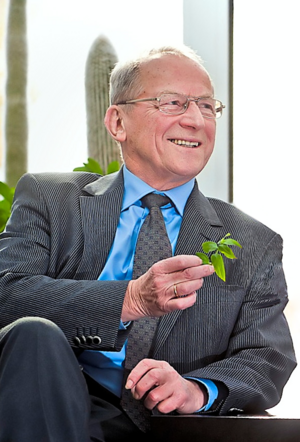Benno Parthier (1932-2019)
Benno Parthier was born 1932 in Holleben near Halle. He studied biology at the Martin Luther University Halle-Wittenberg (MLU) and received his doctorate in 1961 on the subject of plant nitrogen and protein metabolism. From his mentor, the institute’s founder and Leopoldina President Kurt Mothes, Parthier recieved decisive impulses for his further personal development. In the early 1960s, he independently investigated the formation and maturation of chloroplasts. His findings in this field resulted in a highly renowned Nature publication. In 1965 and 1966, Parthier joined the University of Stockholm as a visiting scholar, where he established the use of antibiotics to study protein biosynthesis in different plant cell compartments. This approach proved to be an important instrument of plant physiology in the decades to come. After his habilitation, Benno Parthier headed the Department of Molecular Biology at the institute of Plant Biochemistry (IBP) from 1967 to 1990. He was appointed Professor of Molecular Biology by the Academy of Sciences in 1975.
Benno Parthier was known for his inspiring lectures and eloquent speeches. With his skillful guidance of students, he contributed greatly to promoting Halle as an attractive location for the next generation of scientists. His efforts also led to the establishment of a biochemistry course at the MLU in 1967 – the first of its kind at a German university.
----------------------------------------------------------------
Pinoeer in chloroplast biology and jasmonic acid research
In the 1970s, the work of Parthier‘s department on chloroplast biogenesis and differentiation led to groundbreaking results in Europe. He established Euglena gracilis as a model organism for the investigation of chloroplast physiology. With the conference on the regulation of plant development processes in 1977, Parthier successfully organized one of the first international congresses in the field in Halle (Saale): Considering the political situation in East Germany and the reprisals against him and his colleagues at that time, this was a bold move and an important sign for the academic freedom. Further international conferences followed. At the end of the 1980s, he focused his research on jasmonic acid, a newly discovered plant signal substance that was postulated to be a phytohormone. This hypothesis was proven over the next few years with strong participation of the plant scientists from Halle, who also succeeded in isolating the new plant hormone for the first time. Parthier and his colleagues comprehensively examined this field and thus paved the way for phytohormone research at the institute. Until today, the IPB is regarded worldwide as a well-known center for jasmonate research.
---------------------------------------------------------------
Parthier’s role during German reunification
In the turbulent times of political change in East Germany, Benno Parthier was strongly committed to the institute's emancipation from political paternalism. In 1990, he was democratically elected as the new director by the institute’s staff. One year later the state government of Saxony-Anhalt officially appointed him founding director of the re-established institute. In this position, Parthier had the difficult task of leading the institute safely through the first external review by the German Science Council. Subsequently, as an advisory member of the IPB founding committee, he implemented the recommendations of the German Science Council in factual and personnel matters. Due to the national importance of its research, it was recommended that the institute should be included in the Blaue Liste association that was later renamed Leibniz Association. The institute of Plant Biochemistry (IBP) was closed on 31.12.1991 and reopened on 01.01.1992 as the institute of Plant Biochemistry (IPB) under new legal status. Benno Parthier led the institute from 1992 to 1997 as managing director and was head of the department of hormone research at that time. In 1993, he became Professor for Cell Biology at the Martin Luther University, until his retirement in 1997.
In addition to the scientific profiling of the institute, Parthier as Managing Director also had a considerable involvement in the renewal of the infrastructure. Under his direction, the outdated buildings were modernized, offices and laboratories were equipped according to the latest safety standards and computer workstations were installed. He directed the procurement of large-scale equipment as well as the construction of additional laboratories and greenhouses. At the same time, as a member of the East-West German Commission of the German Science Council, he participated in the evaluation of numerous other East German academic institutes from 1990 onwards and played a major role in the scientific and administrative integration of the former German Democratic Republic institutes into the West German science system. In 1997, Parthier was presented the Federal Cross of Merit (1st Class) for his work in the German Science Council, in 2007 the Olaf-Henkel-Prize for science policy of the Leibniz Association and in 2018 the Order of Merit of the State Saxony-Anhalt. He was also an honorary member of the German Botanical Society and received an honorary doctorate of the University of Würzburg (Germany).
President of the German Academy of Sciences Leopoldina
Parthier's life was tightly intertwined with the National Academy of Sciences Leopoldina. Due to his excellent scientific reputation, he was accepted as a member of the then German Academy of Sciences Leopoldina in 1974, at the age of 42. From 1990 to 2003, as President of the Leopoldina he initiated a number of profiling measures and laid the foundation for the later nomination of the Leopoldina as National Academy. In 2003, the Academy awarded him the Cothenius Medal for his academic achievements. Benno Parthier was a member of numerous other academies of science. He died on 25 August 2019 at the age of 87
This page was last modified on 06 Feb 2025 29 Jan 2025 06 Feb 2025 29 Jan 2025 .



